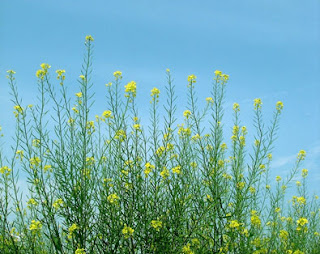The Kingdom of Heaven is like a mustard seed planted in a field. It is the smallest of all seeds, but it becomes the largest of garden plants; it grows into a tree, and birds come and make nests in its branches.
This little parable is found in the first three Gospels, with the version above being taken from Matthew 13:31-32. There's a lot in these two short verses that we might miss, simply because we aren't first century Jews. Apparently, one of the problems facing gardeners of Jesus' time was how to keep out mustard. It was very quick-growing and invasive, like Japanese knotweed and stinging nettles in the UK nowadays. So ancient Jewish gardeners weren't fond of mustard! Shane Claiborne and Chris Haw put it like this in their book, Jesus for President:
When those first-century peasants heard Jesus' images, they probably giggled, or maybe they told him to hush before he got himself killed for using this infamous plant to describe God's kingdom subtly taking over the world.So that's a bit of context we won't notice if we aren't aware of how ancient Jews viewed the mustard plant. There's more to come, though, and this is the part that gets into the territory of badly translated Bible. The 'birds' that Jesus said would make nests in the mustard tree's branches were not powerful, noble eagles or the like, instead they were the unclean birds that farmers and gardeners didn't want anywhere near their land. Quoting from Jesus for President again:
Jesus... said the “fowls” can come and rest in the branches of the mustard bush. The fowls are not the mighty eagles that would dwell in the cedar [see, for example, Numbers 24:6 and Psalm 104:16] but the detestable birds, the ones that ate animal carcasses (Gen. 15:11; Deut 28:26). Farmers didn't want fowls in their garden. That's why they put up scarecrows. Bless his heart, Jesus was saying the Kingdom of God is “for the birds”; the undesirables find a home in this little bush.Jesus chose his parables and metaphors so well, yet we miss much of his meaning if we don't dig a little bit into the culture of his time. And we could miss the real significance of Jesus likening his kingdom to the mustard plant – 'a wild contagion of a weed, a healing balm, a sign of upside-down power – official sponsor of the Jesus revolution'.
Previous posts in the Badly Translated Bible series
Did Jesus get the future wrong?
Looking at Mark 13:30, did Jesus predict his second coming within the next 30 years or so?
Seek first God's kingdom...
Matthew 6:33 - should it be God's kingdom and his righteousness, or is 'justice' a better translation. What difference does it make?






No comments:
Post a Comment